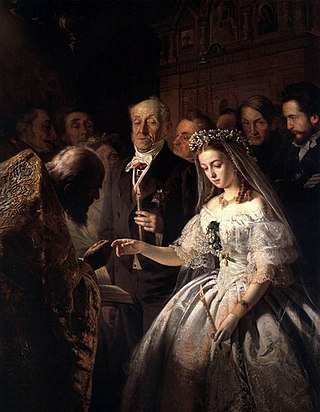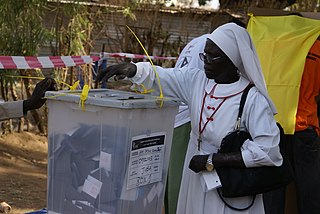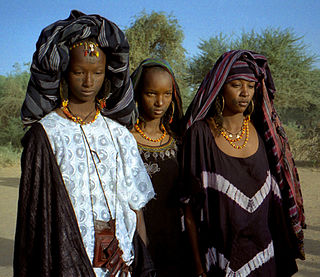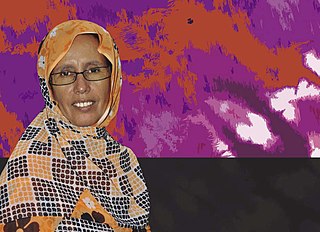Related Research Articles
Marriageable age, marriage age, or the age of marriage is the general age, a legal age or the minimum age marriage. Age and other prerequisites to marriage vary between jurisdictions, but in the vast majority of jurisdictions, the marriage age as a right is set at the age of majority. Nevertheless, most jurisdictions allow marriage at a younger age with parental or judicial approval, especially if the female is pregnant. Among most indigenous cultures, people marry at fifteen, the age of sexual maturity for both the male and the female. In industrialized cultures, the age of marriage is most commonly 18 years old, but there are variations, and the marriageable age should not be confused with the age of majority or the age of consent, though they may be the same.
Child marriage is a marriage or domestic partnership, formal or informal, between a child and an adult, or between a child and another child.

Forced marriage is a marriage in which one or more of the parties is married without their consent or against their will. A marriage can also become a forced marriage even if both parties enter with full consent if one or both are later forced to stay in the marriage against their will.

Women in the Democratic Republic of the Congo have not attained a position of full equality with men, with their struggle continuing to this day. Although the Mobutu regime paid lip service to the important role of women in society, and although women enjoy some legal rights, custom and legal constraints still limit their opportunities.

Issues impacting Women in Mauritanian society include female genital mutilation, child marriage, and polygamy.

Human rights in Mauritania are generally seen as poor according to international observers, including Freedom House, the United States Department of State, and Amnesty International.
Leblouh is the practice of force-feeding girls from as young as five to nineteen, in countries where obesity was traditionally regarded as desirable. Especially prevalent in rural areas and having its roots in Tuareg tradition, leblouh is practiced to increase chances of marriage in a society where high body volume used to be a sign of wealth.

Child marriage in India, according to the Indian law, is a marriage where the woman and man both are younger than 21 years of age respectively. Most child marriages involve women, many of whom are poor socio-economic conditions.

International Day of the Girl Child is an international observance day declared by the United Nations; it is also called the Day of Girls and the International Day of the Girl. October 11, 2012, was the first Day of the Girl Child. The observation supports more opportunity for girls and increases awareness of gender inequality faced by girls worldwide based upon their gender. This inequality includes areas such as access to education, nutrition, legal rights, medical care, and protection from discrimination, violence against women and forced child marriage. The celebration of the day also "reflects the successful emergence of girls and young women as a distinct cohort in development policy, programming, campaigning and research."

Women in South Sudan are women who live in and are from South Sudan. Since the Independence of South Sudan on 9 July 2011, these women have gained more power but still face issues of inequality. Many women in this area do not have adequate access to health resources and education. While these women often face inequality, there has been progress since South Sudan's official declaration of independence. In recent years, this inequality has gained national attention and people have become more interested in the issue of child marriage that this area faces. Along with this, there has started to be a focus on the very high level of maternal mortality in South Sudan. With a maternal mortality rate of 789 deaths per 100,000 live births, South Sudan has one of the highest rates in the world.

Women in Niger are women that are from or live in the West African country of Niger. These women belong to a population in which 98% are practitioners of Islam. Laws adopted by the government of Niger to protect the rights of Nigerien women are most often based on Muslim beliefs.

Child marriage is a marriage or union between a child under the age of 18 to another child or to an adult. Child marriage is common in a multitude of African countries. In South Sudan, child marriage is a growing epidemic. Child marriage in South Sudan is driven by socioeconomic factors such as poverty and gender inequality. Current figures state that South Sudan is one of the leading countries in the world when it comes to child marriage. Child marriage has negative consequences for children, including health problems and lower education rates for South Sudanese girls. Many initiatives have been taken to combat child marriage in South Sudan, but the presence of societal norms and instability continues to drive its presence in the nation.
Child marriage in the Democratic Republic of the Congo is the eighteenth highest in the world. In a child marriage, one or both parties are under the age of eighteen years old. In the Democratic Republic of the Congo (DRC), 37% of girls are married before they turn eighteen, and 10% of girls are married before age fifteen. Though significantly less than the rate of child marriage for girls, 6% of boys in the DRC are married before age eighteen.
According to the Somali government, in 2020, child marriages in Somalia, known to deprive women of opportunities to reach their full potential, have among women aged 20-24, 36 percent of total population.
Child marriage is the betrothal of girls and boys below the age of 18.
UNICEF's Early Marriage: A Harmful Traditional Practice report characterizes child marriage as a harmful institution that often exposes young women in developing nations to damaging domestic, health, and sexual conditions. The report also highlights the practice as a human rights violation. In World Vision's "Before She's Ready: 15 Places Girls Marry by 15", the organization highlights the socioeconomic consequences of child marriage on girls, noting that many girls are forced to stop their schooling as a result of their marriages. With the denial of education, girl brides are often not able to make income as adults or become politically active citizens.

Aminetou Mint El-Moctar is a Mauritanian politician and women's rights activist. She was shortlisted for the Nobel Peace Prize in 2015 and is the first Mauritanian woman to be considered for the award.
The Association of Women Heads of Households is a non-governmental women's rights organisation based in Mauritania.

Mauritanian nationality law is regulated by the Constitution of Mauritania, as amended; the Mauritanian Nationality Code, and its revisions; and various international agreements to which the country is a signatory. These laws determine who is, or is eligible to be, a national of Mauritania. The legal means to acquire nationality, formal legal membership in a nation, differ from the domestic relationship of rights and obligations between a national and the nation, known as citizenship. Nationality describes the relationship of an individual to the state under international law, whereas citizenship is the domestic relationship of an individual within the nation. Mauritanian nationality is typically obtained under the jus sanguinis, i.e. by birth in Mauritania or abroad to parents with Mauritanian nationality. It can be granted to persons with an affiliation to the country, or to a permanent resident who has lived in the country for a given period of time through naturalization.
References
- ↑ "Child marriage around the world: MAURITANIA", Girls Not Brides
- 1 2 Chata Malé; Quentin Wodon (March 2016), BASIC PROFILE OF CHILD MARRIAGE IN MAURITANIA (PDF), World Bank Group